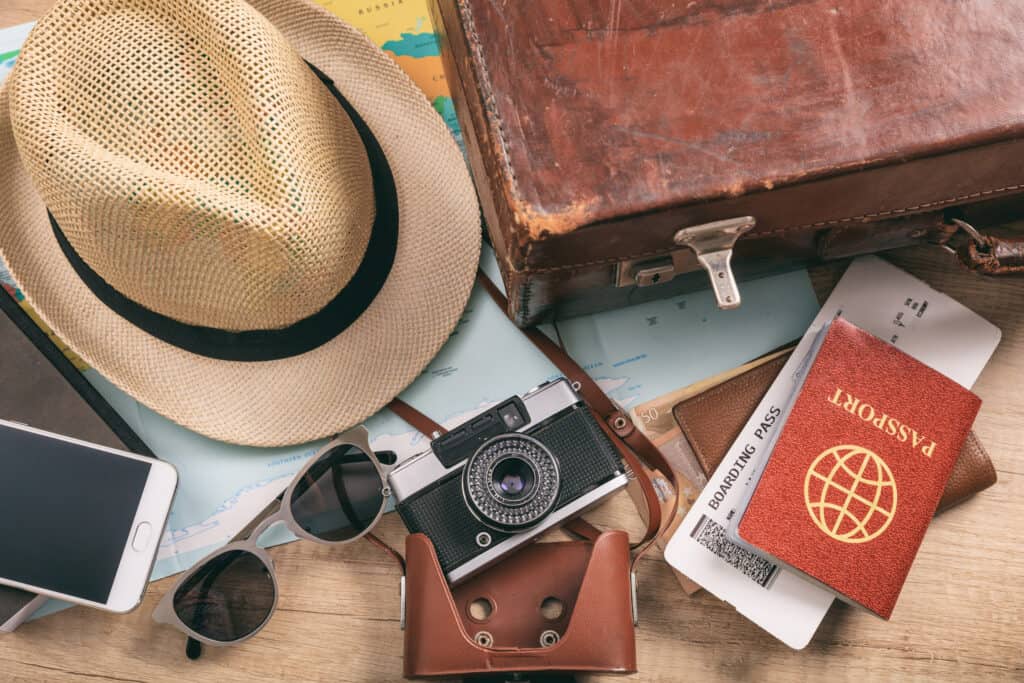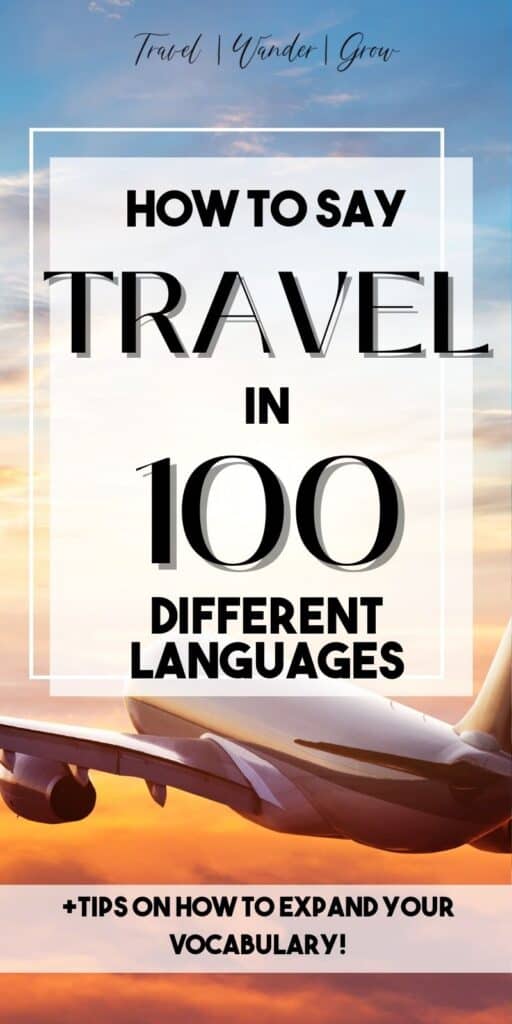How to Say Travel in 100 Different Languages
Do you want to learn how to say travel in different languages? If so, you have come to the right spot!
Travel is the gift that ties all cultures together, and helps us learn from one another. As such, this post provides a list of how to say travel in different languages. I speak three languages, and study linguistics as much as I can. I personally think that the more we know about how others describe the world, the better we will be.
This post begins with the top 25 most spoken languages and then breaks up each of the remaining languages by continent of origin.
The Definition of Travel
For the sake of this post, we are covering the noun travel. The meaning (in English) is as follows: Travel can be defined as the act of moving from one geographical location to another, typically over a considerable distance. It involves exploration, experiencing different cultures, cuisines, traditions, and landscapes. Travel can also be seen as a journey of personal growth and self-discovery, allowing individuals to expand their horizons, gain new perspectives, and create lasting memories.
Interested in improving your language skills? Check out iTalki and Lingopie – my personal favorites for learning languages. These helped me reach and maintaing intermediate Spanish and Portuguese!
Travel in Different Languages: The Top 25 Most Spoken Languages
I’m starting off this post with the languages that are most spoken around the globe, and therefore the most useful languages to know if you are studying a foreign language.
1. Mandarin: 旅行 (Lǚxíng)
Spoken in: China and Taiwan
2. Spanish: el viaje (vee-ah-hey)
Spoken in over 18 countries and territories, including Spain, Argentina, Bolivia, Chile, Colombia, Costa Rica, Cuba, Guatemala, Mexico, and Puerto Rico.
3. English: travel
English is a major language in the US, the United Kingdom, Canada, Australia, and New Zealand.
4. Arabic: السفر (alsafar)
Arabic is spoken in 25 countries, but the language does differ greatly from African countries (e.g., Morocco, Algiria) to the Gulf / Middle East countries (e.g., Kuwait, the UAE). Egyptian Arabic is most commonly taught as a “neutral” version that can be understood by the majority of speakers.
5. Hindi: यात्रा (yaatra)
Hindi is one of the official languages of India (alongside English).
6. Portuguese: a viagem
Portuguese is the official language of Portugal, Brazil, Angola, Cabo Verde, Guinea-Bissau, Mozambique, São Tomé and Príncipe and East Timor.
7. Bengali: একটি ভ্রমণ (Ēkaṭi bhramaṇa)
Spoken in Northeastern India and Bangladesh.
8. Russian: поездка (poyezdka)
Russia is the official language of Russia, Belarus, Kyrgystan, and Kazakhstan, and spoken in several former Soviet countries.
9. Japanese: 旅 (tabi)
Japan is the official language of Japan and spoken widely in Hawaii too.
10. Landha (Western Punjabi): ਯਾਤਰਾ (Yātarā)
Landha is spoken in parts of Pakistan and India.
11. Vietnamese: du lịch
Vietnamese is the official language of Vietnam.
12. Turkish: seyahat
Turkish is the official language of Turkey and also spoken in nearby countries such as Cyprus, Iran, Iraq, and more.
13. Marathi: Pravāsa
Marathi is spoken in western and central India (including Mumbai).
14. Telugu: ప్రయాణం (Prayāṇaṁ)
Telugu is spoken in Southern India.
15. Malay: perjalanan itu
Malay is spoken primarily in Malaysia, and some neighboring countries.
16. Korean: 여행 (yeohaeng)
Korean is spoken in both North Korea and South Korea.
17. French: le voyage
French is the official language of 28 countries, including France, Benin, Congo, Monaco, Senegal, and more.
18. Tamil: அந்த பயணம் (Anta payaṇam)
Tamil is the official language of the Indian state of Tamil Nadu.
19. German: die Reise
The German langauge is official in German, Austria, Switzerland, and Liechtenstein. It also is widely spoken in the Italian province of South Tyrol, Luxembourg, and Belgium.
20. Urdu: سفر (sufuh)
Urdu is the national language of Pakistan, and it has strong lexical similarity to Hindi (both derived from ancient Sanskrit).
21. Javanese: lelungan
Javanese is the official language of Indonesia.
22. Italian: il viaggio
Italian is the official language of Italy, as well as San Marino, and certain provinces in Switzerland. It is the closest language to ancient Latin.
23. Farsi: سفر
Farsi is also known as Persian, and is the official language of Iran.
24. Gujarati: પ્રવાસ (Pravāsa)
Gujarati is primarily spoken in the Indian state of Gujarat.
25. Pashto: سفر
Pashto is spoken in Afganistan, Pakistan, and Iran.
Travel in Different Languages: African Languages
26. Afrikaans: die reis
27. Amharic: ጉዞው (guzowi)
28. Bambara: taama in na
28. Fulani: yaadu
29. Hausa: tafiyar
30.Igbo: njem ahụ
31. Malagasy: ny dia
32. Oromo: imala sana
33. Shona: kufamba
34. Somali: safarka
35. Sudanese: perjalanan
36. Swahili: safari
37. Tigrinya: ምጉዓዝ
38. Twi: akwantuo
39. Xhosa: uhambo
40.Yoruba: irin-ajo naa
41. Zulu: uhambo
Travel in Different Languages: Asian Languages
42. Armenian: ճանապարհորդություն (chanaparhordut’yun)
43. Assamese: ভ্ৰমণ
44. Azerbaijani: səyahət
45. Burmese: ခရီးသွား (hkareeswarr)
46. Cantonese: 去旅行 (hoi loi hung)
47. Cebuano: ang pagbiyahe
48. Filipino: paglalakbay
49. Georgian: მოგზაურობა (mogzauroba)
50. Hebrew: לִנְסוע (keday lensoa)
51. Indonesian: bepergian
52. Kannada: ಪ್ರಯಾಣ (Prayāṇa)
53. Kazakh: саяхат (sayaxat)
54. Khmer: ការធ្វើដំណើរ (kar thveudamnaer)
55. Kurdish: gerrîn
56. Kyrgyz: саякат (sayakat)
57. Laotian: ທ່ອງທ່ຽວ (thong thiav)
58. Mongolian: аялал (ayalal)
59. Nepali: यात्रा (Yātrā)
60. Sinhala: සංචාරය (saṁcāraya)
61. Thai: การท่องเที่ยว (Kār th̀xngtheī̀yw)
62. Turkmen: syýahat
63. Uzbek: sayohat
Travel in Different Languages: European Languages
64. Albanian: udhëtimin
65. Basque: bidaia
66. Bosnian: putovanje
67. Bulgarian: пътуването (pŭtuvaneto)
68. Catalan: el viatge
69. Corsican: u viaghju
70. Croatian: putovanje
71. Czech: cestování
72. Danish: rejsen
73. Dutch: de reis
74. Estonian: reisimine
75. Finnish: matkaa
76. Galician: a viaxe
77. Greek: το ταξίδι (to taxídi)
78. Hungarian: az utazás
79. Icelandic: ferðalagið
80. Irish: an taistil
81. Latin: de peregrinatione
82. Lithuanian: kelionė
83. Luxembourgish: d’Rees
84. Macedonian: патувањето (patuvanjeto)
85. Maltese: l-ivvjaġġar
86. Norwegian: reisen
87. Polish: Podróż
88. Scottish Gaelic: an siubhal
89. Swedish: resan
90. Ukranian: подорож (podorozh)
91. Western Frisian: de reis
92. Welsh: y teithio
Travel in Different Languages: North American Languages
93. Hatian Creole: vwayaj la
94. Nahuatl: nenemi
Travel in Different Languages: Oceanic Languages
95. Hawaiian: ka huakaʻi
96. Maori: Te Haerenga
97. Samoan: le malaga
Travel in Different Languages: South American Languages
98. Aymara: ukatsti uka viaje
99. Guarani: Pe Jeguata
100. Southern Quechua: chay puriyta

The Best Apps and Resources for Language Learning
If you are interested in learning a new language, here are a few apps and resources I think may be the most helpful to you:
iTalki
As I mentioned in my post on Spanish phrases, practicing is really key to feeling comfortable using a new language. You can practice with native speakers by using my favorite language resource, iTalki. On this site you can practice with a tutor, formal teacher, or others just seeking to do a language exchange (for free!). It is hands down the best way to expand your language skills.
Lingopie
This app is best for improving your reading comprehension. And believe it or not, improving your reading comprehension is maybe the best way to consistently expand your vocabulary. (Consider how babies learn languages). On this app, you are provided with videos that come with captions to help you pick up on the vocabulary that you hear. Try Lingopie today!
Duolingo
While I can’t recommend Duolingo alone for learning a langauge, I recommend using this free app to expand and practice your vocabulary in a new language. Note, there is a paid option, but I think the free version is all that you need with this one.
Drops
Even better for building vocabulary is Drops, in my opinion. It has a variety of more real-life categories that you can opt for yourself to learn from. You do have to pay an annual fee, but it is absolutely worth it.
Google Translate
If you don’t have time to learn a language before you travel. I recommend using one of the best translation apps out there – Google Translate. This app does wanders for picking up live conversations so you can chat with people like taxi drivers or other new friends in the local language. Even if it is a little indirect.
FAQs About Travel in Different Languages
The root word for “travel” is derived from the Old French word “travailler,” which means “to work, labor, toil, or journey.” Interestingly, it originally denoted the strenuous nature of medieval journeying. Hence, travel inherently carries the essence of a laborious journey.
The word for longing for travel is “wanderlust.” Wanderlust can also be described as a wistful longing for travel as well.
The Old English word for travel is “faran,” which essentially means to journey or to go. It conveys the sense of moving from one place to another, much like the modern term ‘travel’.
Journey
Voyage
Tour
Trip
Expedition
Trek
Roam
Navigate
Wander
Cruise
Travel itch
Fernweh
Desire to travel
Travel bug
Itchy feet
Globetrotting
Adventurousness
Nomadism
Exploration obsession
Journeying passion
In Summary | Travel in Different Languages
I hope that this post has inspired you to explore languages more, or at the very least, inspired you to experience a bit of wanderlust. Learning how to say words like travel in different languages is the start to breaking down language barriers and is a great way to get to know new people in any new place. I hope you will now begin to channel your love of travel into something fruitful, such as learning a second language.
More Words in Different Langauges
Interested in Learning More? Check Out these Travel Language Guides:
- Spanish for travel
- Portuguese for travel
- Japanese for travel
- Greek for travel
- French for travel
- Italian for travel
- Thai for travel
- Languages and travel
Don’t forget to pin this for later!


